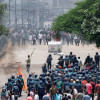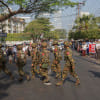Myanmar gets ready for NLD government
The National League for Democracy (NLD) is getting ready to form the new government in Myanmar, under the leadership of Nobel laureate Aung San Suu Kyi.
The November 8, 2015 general elections in Myanmar had returned Suu Kyi's NLD with a massive mandate. The 2008 Constitution of the country reserves 25 percent of the seats for the military in each of the two houses. Out of 440 seats in lower house, 110 seats have gone to military appointees. NLD won 255 seats out of the remaining 330, which were up for election. The incumbent Union Solidarity and Development Party (USDP) managed only 30 seats; the remaining 45 going to other parties. In the 224-seat upper house, 56 were taken by unelected soldiers, leaving 168 seats for election. NLD secured 135 seats, USDP got 11 seats and other parties took 22 seats.
The new Parliament will go into session on February 1, 2016, when the process of electing the new president and key posts of the parliament will be completed. The names of the elected MPs have already been announced by the Election Commission. With the recent announcement of names of the military MPs, which includes two major generals, the formation of the new legislature is complete. Fifty years of military rule will come an end when the new government takes office from March 2016.
The election of the president will go through an interesting process. The elected members of the upper house and the lower house will each nominate a candidate. The unelected military MPs of the two houses will nominate one candidate. Among the three candidates whoever gets majority of votes of the two houses combined will become the next president. The two other candidates will become vice-presidents.
The NLD nominations for the Parliament posts have been made keeping in mind ethnic sensitivities and representations. Win Myint, representing Burmese ethnic majority, will be the speaker of the lower house. His deputy will be T Khun Myat, an ethnic Kachin and member of USDP. The speaker of the upper house will be Win Khaing Than, an ethnic Karen, while his deputy will be Arakanese Aye Thar Aung from Arakan National Party. Suu Kyi's strategy is to build a broad based support for her government.
In a statement before the elections, Suu Kyi said, "I'll be above the president [who] will be told exactly what he can do". There are some speculations that Suu Kyi's personal physician Tin Myo Win (64), former political prisoner and her confidante, may be nominated to become the next president. Whether the military will accept a proxy president is not clear at this stage. Suu Kyi seems to be influenced by the Indian Congress-led UPA government where Congress chairperson Sonia Gandhi called the shots.
President Thein Sein, in his last address to the outgoing legislature, has hailed the election as a "triumph for all of Myanmar's people". He promised to help the new government with the transition process. Speaking on USDP's defeat, Thein Sein said that his party had not launched reforms in order to hold on to power. Thein Sein, a retired general, deserves credit for being instrumental in reforming the political process that eventually led to credible elections in November 2015.
Aung San Suu Kyi (70) knows that she cannot become president because of a Constitutional bar, and considering that there are several challenges in the transition process. She has been meeting Army Chief General Min Aung Hlaing and President Thein Sein to discuss a smooth transfer of power. She also met strongman Than Shwe (82), former president and head of USDP, who is still very powerful and wields considerable influence over state affairs.
Clearly there is lack of confidence in the armed forces. The military is suspicious that the new civilian government may resort to vengeance and throw some of the generals behind bars. Hence, the safety clause in the Constitution - 25 percent seats will be reserved for the military. The Constitution stipulates that to amend it, three-fourth majority will be required in both houses of the Parliament. This means that since NLD does not have 75 percent seats - to pass any amendment, the military MPs will have to be on board. Given the structure of the Parliament and the political alignment, the military MPs are likely to behave like an opposition party.
Suu Kyi's election victory has come with tremendous expectations from the people, who want quick economic development and political freedom. The major challenge for Suu Kyi is to bring the different separatist ethnic groups to a peace process as quickly as possible. Procrastination in dealing with ethnic wars will give the military an opportunity to meddle in the affairs of the government.
According to the Constitution, three important ministries of the government - defence, home affairs and border control - will not go to NLD ministers but will remain under army control. To further strengthen the army's role, Thein Sein has decided to merge the Ministries of Immigration and Population with the Ministry of Home Affairs. This will make the ministries even more powerful, particularly because government bureaucracy is mostly manned by military officials.
From the way the power transfer process is moving, it is clear that Suu Kyi is making compromises to build trust with the anxious military. Suu Kyi does not want to curb the military's power; she wants to bring them under civilian control. Even after winning convincingly, she is negotiating with the military for transfer of state power, as she does not intend to rock the boat too much, too soon. Suu Kyi does not want a repeat of the 1990 election when the military refused to transfer power.
It is clear that the NLD government is not going to get full powers – it will have to share it with the military. It will be what the Tatmadaw calls a "disciplined democracy".
The writer is former Ambassador and Secretary.

 For all latest news, follow The Daily Star's Google News channel.
For all latest news, follow The Daily Star's Google News channel. 








Comments